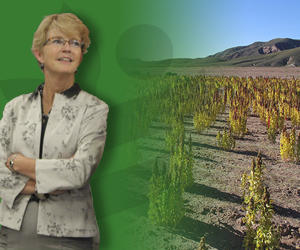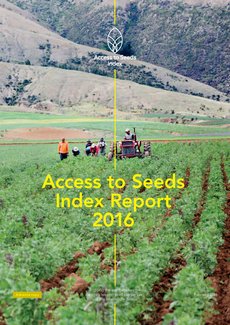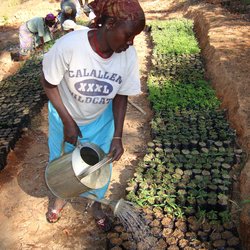Access to Seeds – why seed companies need to bridge the gap to reach smallholder farmers

In this month’s blog, Ann Tutwiler, Director General, Bioversity International, focuses on the first Access to Seeds Index published last week, which ranks private sector seed companies on their efforts to reach smallholder farmers.
In this month’s blog, Ann Tutwiler, Director General, Bioversity International, focuses on the first Access to Seeds Index, which ranks private sector seed companies on their efforts to reach smallholder farmers. The report which evaluated global and East Africa seed companies, highlights innovative practices by East African seed companies whose business models set the standard for engaging smallholder farmers.
The first Access to Seeds Index, which was launched last week, evaluated and ranked the world’s leading global field crop and vegetable seed companies in four regions on their policies and practices to improve access to quality seeds for smallholder farmers in developing countries. Worldwide, over 2.5 billion people manage 500 million small farms and in Africa alone, smallholders produce 70% of the continent’s food supply. To increase production, improve nutritional quality and adapt to climate change, these farmers need access to appropriate and high quality seeds.
At present, the private sector plays a minor role in reaching African smallholder farmers – only 2.5% of seeds used by smallholder farmers in sub-Saharan Africa come from seed companies. Yet the private sector is well-placed to boost smallholder productivity: quality seeds of improved varieties have enabled farmers in advanced agricultural systems to triple their yields. Farmers in Africa could see similar benefits from the knowledge, technologies and germplasm these private firms have to offer.
 The 2016 Access to Seeds Index shines a welcome spotlight on what the global and the African private sectors are already doing to offer farmers in developing countries improved access to quality seeds. The Index covers seven topics, each with indicators on commitment, performance, transparency and innovation. A separate Regional Index was compiled for Eastern Africa with slightly adapted measurements and indicators. Visit the Access to Seeds website for full details.
The 2016 Access to Seeds Index shines a welcome spotlight on what the global and the African private sectors are already doing to offer farmers in developing countries improved access to quality seeds. The Index covers seven topics, each with indicators on commitment, performance, transparency and innovation. A separate Regional Index was compiled for Eastern Africa with slightly adapted measurements and indicators. Visit the Access to Seeds website for full details.
Apart from the rankings, the Index identifies a number of opportunities and good practices that seed companies could adopt to reach smallholder farmers.
In Eastern Africa, regional companies outperform their global peers in many areas, such as breeding for local crops, reaching remote villages, and addressing the needs of women farmers. Around 50% of smallholder farmers are women yet only three global companies explicitly focus on women farmers’ input and training needs. Regional companies also show more focus on targeting diverse local crops and using smallholder feedback and considering local preferences to inform R&D decisions. They also outperform the global companies on the conservation and use of genetic diversity.
For example, East-West Seed, leader of the Regional Index, performs strongly across all measurement areas, with programmes and initiatives supporting access to seeds for smallholder farmers and the commitments and policies to back them up. East-West Seed considers 90% of its customer base to be smallholders, and actively employs smallholders as co-producers of seeds. The company develops and markets a diverse number of crops and varieties, including traditional African leafy vegetables that are resilient and important for nutrition, such as amaranth, black nightshade and spider plant. East-West Seed also supports public domain genebanks in Peru and Indonesia.
Of course, access to private sector seeds is not a silver bullet solution for smallholder farmers. They also need access to knowledge, finance and markets, and an enabling policy environment for both the farmer and the seed companies. Smallholder farmers also need improved capacity within informal seed systems to offer quality seeds: a recent study* showed that for 40 crops across 6 countries, farmers access 90.2% of their seed from informal systems.
 With 2.5 billion people depending on smallholder farming, it makes good business sense for global and regional private sector seed companies to develop business models with smallholders at their core.
With 2.5 billion people depending on smallholder farming, it makes good business sense for global and regional private sector seed companies to develop business models with smallholders at their core.
Innovations highlighted by the regional seed companies include offering smaller seed packets that use a mix of local languages and pictures for illiterate customers; and new distribution channels to reach remote farming communities, such as a tuk-tuk mobile seed shop in Uganda. These are early steps but in the right direction.
When you consider that the smallest seed has the potential to help deliver on multiple sustainable development goals to improve nutrition, reduce poverty and increase resilience in smallholder production systems, leveraging the extra knowledge and investment for a public good can only be a positive force.
M. Ann Tutwiler
- Visit the Access to Seeds Index website
- Read theAccess to Seeds Index Press Release
- Read more Ann Tutwiler blogs on DG Dialogues
*Source: Seed systems smallholder farmers use
Photo: Farmer watering African leafy vegetable seedlings. Credit: Bioversity International/P. Maundu
Additional information:
Ann Tutwiler sits on the supervisory board for the 2016 Access to Seeds Index which focuses on the seven global leaders in field crops (such as maize, rice and wheat), ten global leaders in vegetable seed and zooms in on seventeen leading seed companies in Eastern Africa. The Index, published by the Access to Seeds Foundation, an independent, non-profit organization based in Amsterdam, rates each company’s policies and practices to reach the smallholder farmer. The results will be published in the Financial Times. The research for the Index was provided by Sustainalytics, a leading global provider of environmental, social and governance research, ratings and analytics. It is funded by the Dutch Government and the Bill & Melinda Gates Foundation.
